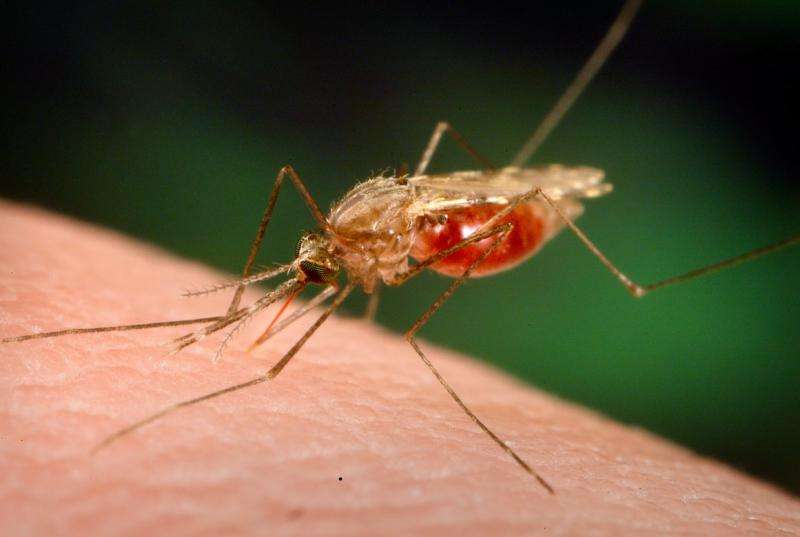Researchers find a promising way to outwit mosquitoes

Mosquitoes are brilliant at two things – bringing misery to humans and quickly spoiling all efforts to shut them down.
But researchers at UC Riverside have found a weakness in the very genes that make mosquitoes so good at adapting to the insecticides humans use to keep them at bay.
The ability to adapt is a critical survival tool for most species, said Colince Kamdem, postdoctoral scholar in entomology at UCR. "One of the main advantages of mosquitoes is that they are extremely polymorphic, which means they have a high amount of natural diversity, a really great advantage to adapting to many different conditions."
Kamdem and his colleagues dug into the chromosomes of the virulent Anopheles funestus mosquito species, hoping to better understand its rapid adaption abilities. They chose this species because of its extreme efficiency in spreading the most deadly malaria parasites across a wide section of sub-Saharan Africa.
The researchers discovered the genetic diversity that makes mosquitoes so adaptable was primarily located in only one of five chromosome "arms" present in the species. The other four chromosome arms are relatively stable and unchanging, which means they could be excellent candidates for gene engineering, Kamden said.
Gene drive systems have shown promise for adding beneficial or detrimental genes to a population that are heritable, meaning the changes continue with new offspring. In the case of A. funestus, the goal would be to eradicate the mosquito by manipulating its genes.
The beauty of gene drive systems is that the changes would stay within the target species – leaving other species of mosquitoes intact – without the use of insecticides, which mosquitoes seem to rapidly adapt to in just a few years.
But there's a problem. Researchers have found the new gene tracks can collapse if mutations occur across the target gene. That means the new genes need to be inserted in portions of the genome with very little standing genetic variation, that is, low levels of recombination or polymorphism.
That's why Kamdem and his team are so excited about their findings.
"We're looking for weaknesses in the natural population that makes them suitable for specific techniques, such as genetic manipulation," he said. "We're pretty confident we've found the back door."

The four chromosome arms found in A. funestus are relatively stable, with very low levels of recombination and polymorphism.
"(That) makes this species particularly suitable to gene drive work," Kamdem said.
Kamdem, a native of the African nation of Cameroon, has personal experience with the devastation of malaria, a disease caused by Plasmodium parasites that are transmitted to people through the bite of infected female Anopheles mosquitoes.
In 2015, there were 212 million cases of malaria around the world, and 429,000 deaths, according to the World Health Organization (WHO). A total of 91 countries – nearly half the world's population – was at risk of malaria, including populations in Southeast Asia, Latin America, and the Middle East, according to WHO data. But Africa – particularly sub-Saharan Africa – was home to 90 percent of malaria cases and 92 percent of malaria deaths in 2015.
While doing research in Cameroon, Kamdem met fellow UCR postdoctoral researcher Caroline Fouet, and UCR Entomology Professor Bradley J. White, who now works with Google's Verily Life Sciences mosquito eradication project.
The three worked together on this research, and while the results are promising, there's much more to be done before gene drive scientists can start manipulating the mosquito's genomes, Kamdem said.
The next phase of their research involves taking a deeper look at the genes in those stable chromosome arms to provide a kind of detailed map for gene drive scientists.
"With the techniques we are currently implementing, the resolution will be an order of magnitude higher than what we have now," Kamdem said. "The level of detail can even come up with specific positions of different genes, so we'll be able to provide exceptional level of detail about the gene protocol."
Kamdem warns that genetic manipulation also has some hurdles to overcome before it's a viable option in the war against insect-borne diseases, but after years of watching mosquito genomes quickly adapt to a variety of new insecticides, he is hopeful about the potential of using gene drive systems to finally outwit A. funestus' innate ability to adapt and survive.
Their findings, "Chromosome arm specific patterns of polymorphism associated with chromosomal inversions in the major African malaria vector, Anopheles funestus," were published in the journal Molecular Ecology on Aug. 21.
More information: Colince Kamdem et al. Chromosome arm-specific patterns of polymorphism associated with chromosomal inversions in the major African malaria vector, Anopheles funestus, Molecular Ecology (2017). DOI: 10.1111/mec.14335
Journal information: Molecular Ecology
Provided by University of California - Riverside

















